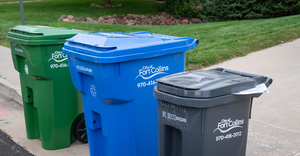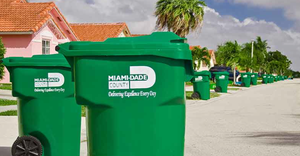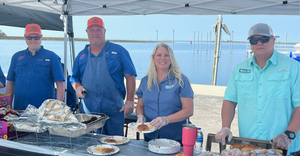Recycling is BS: Combating Myths and Altering Perceptions
Eight out of 10 Americans report recycling is worth the effort, yet even in neighborhoods with curbside recycling collection, more than half of recyclables end up in the trash. A correlation exists between confidence and positive recycling behaviors.
June 17, 2024

An interesting and informative session began with moderator Nicholas Trout, Supplier Development Administrator II, at Sourcewell, interviewing Cody Marshall, Chief System Optimization Officer at The Recycling Partnership, a mission-driven organization committed to building a stronger recycling system in the U.S.
“Initially part of the initial challenge was trying to understand the overall U.S. system,” Mr. Marshall stated. “No central database contained all the information. What may be recyclable in your hometown might not be recyclable in mine. There were 9,000 separate recycling programs in the United States, each operated independently.”
Mr. Marshall continued by explaining that he began calling 400 local governments to learn about their recycling programs, which built the beginning of a national database. “Today, our national database is the comprehensive source for local recycling information across the U.S.”
Mr. Marshall shared many of his research findings into what it will take from everyone in the value chain to accelerate recycling best practices. For example, he reported that 84% of respondents said seeing a card with basic recycling information would give them more confidence in recycling, yet, only a fourth of them remember receiving the information. Only 47% said they believe their recyclables are always or usually made into new things. He said the key is to truly build confidence in the system so that recycling is done properly. This would help contamination reduction, process improvement, and efficiency and lead to more resource recovery and revenue.
Companies in the packaging industry must commit to advancing circularity, setting a range of goals to drive accountability. Recycling is a pillar of the circular economy, helping to deliver on waste management goals as well as climate and economic targets. But a confluence of factors has shaken trust in the US recycling system in recent years. The ability of companies to meet their packaging goals depends on robust recycling infrastructure.
Mr. Marshall revealed that 40 million U.S. households still lack the ability to recycle as easily as they can throw something away. Therefore, building equitable access to recycling services is a critical step to a stronger system. To elaborate on this point, Trout and Marshall were then joined by three experts from the field, who added their observations about challenges and solutions:
• Louis Cummings, Solid Waste Manager, Kansas City
• Jerry Schuber, Director of Solid Waste, Broken Arrow, Okla.
• Alan Morrison, Division Manager, Orlando’s Solid Waste Division, Orlando, Fla.
Mr. Cummings shared some of the challenges and solutions to launching a recycling program in Kansas City, Mo. He explained that convenience was a necessity, so $8 million was invested for recycling carts that are heavy-duty enough to stand up to high winds and rough handling. Another challenge was tackling confusion about what people should put into their bin. This was overcome with a comprehensive educational program what should and should not go into recycling carts. Mr. Cummings attributed a key to success as unlocking behavior change by using the right tools, motivation, and illustrating how and why to recycle. He added that some of the success stories didn’t much of money.
For example, Mr. Cummings said citizens in the Kansas City region speak as many as 60 different languages. Rather than print multi-lingual literature, each cart carries a QR code. When a citizen scans the code, the first prompt asks him or her to choose their preferred language.
Mr. Schuber described the importance of interacting with the city’s recycling team. He stresses to drivers how important their jobs are for the health, safety, and comfort of the community. “A lot of these crews just pick up the trash every day and don't give it much thought as to how important they are to the day-to-day life of everyone who lives in Broken Arrow,” he said. He ensures that they do not go unappreciated and gives drivers a scorecard of the top five performers every week as encouragement.
He also encourages other staff members to engage with the public one-on-one. Renting a booth at a community event has proven to be an excellent method of educating the public on what they can do to improve the effectiveness of recycling. It also boosts morale of the employees.
Alan Morrison stressed the importance of convincing government leaders and the public of the investment value of recycling. He said the cost of recycling goes beyond the cost of carts and trucks. He said recycling could cost three times that of taking waste to a landfill. This makes it important to be transparent. Most of the public is willing to pay more for recycling if they can see where the money goes.
Read more about:
WasteExpo 2024About the Author
You May Also Like


